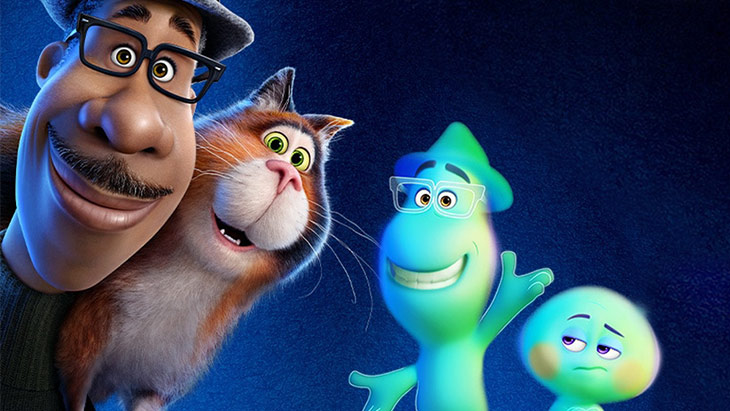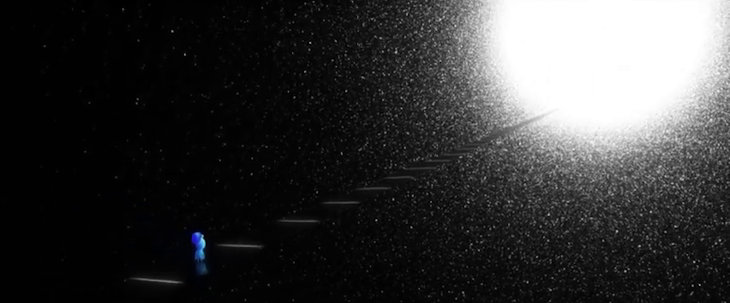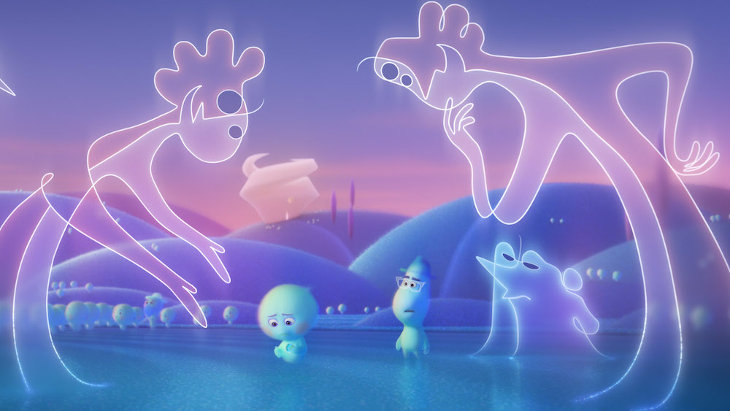 Vampire Weekend's Surprising Jewish Stories
Vampire Weekend's Surprising Jewish Stories


10 min read
Jewish perspectives on the afterlife, purpose, and who you really are.
What happens to us after we die? Who are we, truly, as humans? What is our purpose for living? What is the higher power in the universe? These are just some of the “light” questions that are explored in Disney/Pixar’s latest movie, “Soul.”
The film follows the life of Joe Gardner, a jazz musician who inconveniently dies just as he’s about to star in the big break of his career. His body and soul get separated, and he suddenly, frustratingly, finds himself in the Great Beyond. What happens next is where everything gets interesting.
In many ways the themes of “Soul” intersect with Judaism’s teachings; in others, they diverge. Let’s take a look.
“Against your will you were created, against your will you were born, against your will you live, against your will you will die, and against your will you will give a reckoning and accounting before the King of Kings, the Holy One, blessed is He” (Ethics of the Fathers 4:29).
Joe is told he’s in the “Great Before” – meeting souls before they are sent down to earth. This lines up nicely with the Jewish concept of an “olam ha-neshamot,” a world of souls, from which God chooses when a child is intended to be born in this world. Like “22,” the plucky soul Joe meets who refuses to be born, we all, as the teaching above reveals so beautifully, resist being born. Who would want to be thrust from a world of truth and knowledge and proximity to God’s light, into a world of pain, loss, and lies? Being born is a concession, not a reward.
Judaism teaches that we create our own afterlife with our deeds and choices – and we will have to live with those choices forever.
After we die, we'll be forced to give a reckoning and accounting of all our deeds. Hopefully, there will be proud moments filled with nachas as we reflect on a life well-lived. But we will experience cringe-worthy memories too. Joe finds himself in the “Exhibit of You,” where he wanders through his life’s work, wincing at some of the displays.
“Um, excuse me, what's going on here? Binaca breath spray? Cheap cologne? Man, who curated this exhibit?”
“You did,” says his tour guide.
Judaism teaches that we create our own afterlife with our deeds and choices – and we will have to live with those choices forever. That may be heavenly or hellish, depending on who you are, what you’ve done, and what you value. It’s the exhibit of you, and you have curated it.
 Joe faces The Great Beyond
Joe faces The Great Beyond
The subject of reincarnation arises when Joe and “22” finally do (spoiler alert) come back to earth. Joe is so excited to come back to earth… but he’s reincarnated as a cat. This brings some hilarious moments, but the curious thing is that Joe still has the memories of his previous life. In Jewish reincarnation, the soul, in the worst way, does not want to come back to earth. Remember: the hereafter is a beautiful place of truth and light, and once the soul returns there, it is loath to leave. “Against your will you were born…”
But the purpose of Jewish reincarnation is to complete a task that has gone unfulfilled, called in mystical literature your “tikkun," your rectification. And we do not have memories of our previous life. That would be too easy – we’d know exactly what to do. The point is to find our purpose on our own. It’s another chance to get it right. And while none of us wants to come back down here, we can accomplish great things if we do.
A certain king had a beautiful garden in which was excellent fruit, and over it he appointed two watchmen, one blind and the other lame. The lame man said to the blind one, "I see exquisite fruit in the garden. Carry me there that I may get it, and we will eat it together." The blind man consented and both ate of the fruit (Talmud Tractate Sanhedrin 91b).
The rabbis of the Talmud are teaching us that each human being is a marriage of body and soul. Just as the two men in the parable each need the other to complete the task, the body and soul need each other to do anything in this world. The body needs the soul to direct and animate it with conscience, deliberation, and wisdom, and the soul needs the body to perform all its tasks in this world that will elevate its journey on this planet. Neither can function without the other. Yet, make no mistake regarding who’s the boss:
“All of these great wisdoms are of the soul and not of the body, the soul directing the body as a man rides a horse, its reins in his hand, leading it and guiding it in the direction he desires, so that the horse is subservient to the man and not otherwise. In the same way, the soul leads the body, the soul is the principal, and the body subservient” (Ways of the Righteous).
If you’re not your body, who are you?
When Joe and “22” come back to earth, there’s a small systems glitch (don’t try to outsmart God). Turns out, "Joe" is in the body of a cat. And “22”, played hilariously by Tina Fey, is in the body of… Joe. Now this is a cute and funny device, a la “Freaky Friday,” which brings up many interesting questions about who a person really is. Are you your body? Clearly not. “Joe” is in the body of a cat, and “22” has taken up residence in his previous body.
So if you’re not your body, who are you? Are you your personality? Are you your ambitions? Your dreams, desires, feelings? Yes, yes and yes, and that is what we call your soul. Your soul is a small piece of God that makes you YOU. It is the best version of you, the highest and most noble voice in your collection.
 Joe and 22 in the Great Before
Joe and 22 in the Great Before
Clearly, Joe’s soul is in the cat. This is important to remember as many of us identify strongly with our body, yet often lose radio signal with our souls. As Judaism reminds us, you are a soul. You have a body. The rider is in charge, not the horse. As the saying goes, "We are not human beings having a spiritual experience; we are spiritual beings having a human experience."
“Ultimately, when all is known: revere God, and observe His commandments, for this is the entire purpose of mankind” (King Solomon, Book of Ecclesiastes).
The movie spends a fair bit of time exploring what is our purpose. Is it our spark, what we enjoy most in the world? Is it that thing that puts us in “the zone,” transporting us to another realm, like Joe’s jazz music does for him?
Judaism makes it clear: your reason for living is to connect yourself to your source, to God, and to godliness, and thereby transform yourself into a better person and make the world a better place by shining your unique light wherever you go. That simple, right?
So in a way, Joe’s right when he says about music, “This isn’t about my career, it’s my reason for living.” But he misses a key note: it’s what you do with your music that makes the whole difference. If God gave you a talent, and you don’t use it to transform yourself into a better person and/or make the world a better place, then you have misused God's gift.
King Solomon tells us in Proverbs, “In all your ways you shall know Him,” which means that no matter what you do in this world, from eating breakfast, to showcasing your God-given talents, to making a living, or raising a family, or caring for a neighbor, you can achieve your purpose – if you connect those dots back to God. Taking a brief moment of intent to acknowledge God’s gifts, express gratitude for them, and mindfully plan how you will use your time, your personality, your strengths, for your dual purpose of improving yourself and the world, will be the critical nexus that will determine whether you have, indeed, lived a purposeful life, or simply wasted your potential.
While every human being should certainly try to find his or her “spark,” it’s more significant to figure out how to leverage what we already know about ourselves. What am I good at? What do I enjoy? And then: how shall I use this to connect myself more strongly with my higher power, to spread more godliness on this planet during my sojourn here, and to transform myself in the process from raw potential to something incredible.
“I am the coming together of all quantized fields of the universe. Appearing in a form your feeble human brain can comprehend” (Jerry, “Soul”).
The “godlike” beings in the movie who are all named Jerry (except the one who’s called Terry) are kind and benevolent creatures with Picasso-like animation that changes shapes as you watch. And although they are not, strictly speaking, God, there is an interesting element that can reveal what Judaism teaches us about the most un-knowable concepts of them all: the identity of God.
In Rabbi Aryeh Kaplan’s book “If You Were God,” he creates a scenario asking his readers to imagine themselves in charge of an island. You want to bring the islanders to their highest purpose, but you have a few limitations. One of them is that you can never, under any circumstances, reveal your existence, because that would upset God's delicate balancing act and remove our free will. “Terry,” the godlike being who messes up by switching Joe’s and “22”’s bodies, has to go back down to earth to fix the problem. We see little “zings” of his/her existence traveling through the city, repairing what must be repaired.
God makes Himself discoverable in small ways.
Likewise, God makes Himself discoverable in small ways, called hashgacha pratit, or divine providence. I am a Trip Leader for Momentum, an organization that provides a year-long spiritual experience for Jewish moms, launched by a trip to Israel. On our trips we introduce the concept of “divine providence” on the very first night, abbreviating it helpfully to “HP” – also known as our Higher Power. We challenge the women, during their week in Israel, to find moments where they see little “zings” of God’s presence showing itself in their lives. The most beautiful stories come out, allowing people to feel the hand of God moving things for them.
I like to call these moments a “hug from God.” When I’m having a bad day and feel defeated or discouraged, and then a small ray of sunshine shines on me, that’s a hug from God. When I feel like my problems might overwhelm me, and then a helpful professional or friend shows up to light the way, that’s my hug from God. When I can’t figure out what to do, and an idea “just pops” itself into my head, there’s my hug from God.
So while God is essentially unknowable, He will make Himself known… if we know what to look for and have our eyes and ears open for the hugs.
So what really happens to us after we die? Who are we, truly, as humans? What is our purpose for living? What is the higher power in the universe? These are big questions with big answers, answers one could dedicate their entire lives to. And I recommend that you do! But for a little bite, the film “Soul” has some answers. And your soul has some answers too. So turn up the volume on your soul and listen to its messages.
